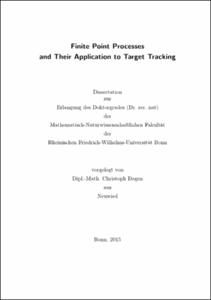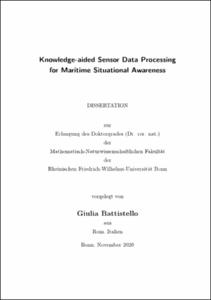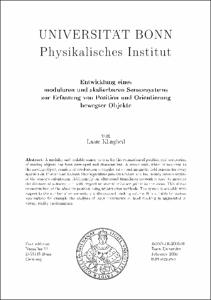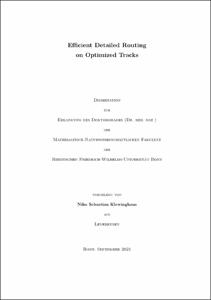Degen, Christoph: Finite Point Processes and Their Application to Target Tracking. - Bonn, 2017. - Dissertation, Rheinische Friedrich-Wilhelms-Universität Bonn.
Online-Ausgabe in bonndoc: https://nbn-resolving.org/urn:nbn:de:hbz:5n-46056
Online-Ausgabe in bonndoc: https://nbn-resolving.org/urn:nbn:de:hbz:5n-46056
@phdthesis{handle:20.500.11811/7104,
urn: https://nbn-resolving.org/urn:nbn:de:hbz:5n-46056,
author = {{Christoph Degen}},
title = {Finite Point Processes and Their Application to Target Tracking},
school = {Rheinische Friedrich-Wilhelms-Universität Bonn},
year = 2017,
month = jan,
note = {Tracking is a branch of sensor data fusion that studies the tracking of dynamic objects based on incomplete and noisy measurements. Due to the enormous demand in the past decades for efficient algorithms, a great number of methods and approaches were developed in this applied branch of senor data fusion. The variety and interconnection of the existing concepts enables on the one hand solutions for scenarios with diverse boundary conditions, but on the other hand exceedingly few scientists can oversee the large variety of concepts. A unification of the existing tracking approaches is therefore important for the deep understanding of this research field.
The theory of point processes is a highly developed tool of probability theory and statistics that, similarly to the theory of stochastic processes, finds application in finance and business mathematics, biology and physics. Point processes are well suited for modeling dynamical objects and sensor measurements appearing in tracking applications, because the number as well as the spatial distribution of the respective elements can be modeled. A complete and unique characterization of the point process is given under certain assumptions by the probability generating functional, which can be used due to its compact form as a representative of the corresponding tracking filter. It is therefore perfectly suited to formulate a unified representation of tracking approaches since all necessary statistical information about the filter are encrypted in it in an intuitive way.
In this dissertation the derivation, characterization and unification of tracking approaches is studied with the help of finite point processes. The finite point process approach is then applied to the passive, non-cooperative localization and tracking of electromagnetic emitters in an urban environment with the help of a mobile antenna array.
The first part of this dissertation derives a theoretical basis for the use of finite point processes for the unification and derivation of tracking filters. It is shown that many well-known tracking filters can be characterized by probability generating functionals, and that the different building blocks of a tracking filter are explained by means of its probability generating functional. The presented representation is suitable to emphasize similarities and differences between specific filters and to develop a fundamental understanding of the existing tracking concepts. Furthermore, it is shown that an individual and customized tracking filter can be easily modeled with the help of the proposed theory. Thus, the derived concept enables tracking engineers to find innovative answers to present questions of target tracking. The first part of this thesis is completed by a comprehensive mathematical foundation for the derivation of tracking filters using the proposed unification.
The second part of this work studies the passive, non-cooperative localization and tracking of electromagnetic emitters in an urban environment using a single mobile antenna array. To this end, tracking filters presented in the first part are implemented using sequential Monte-Carlo methods and refined on the basis of the problem definition. Due to the urban environment the emitted signal is split up by reflection, deflection and scattering into several electromagnetic waves, the so-called multipaths, which travel along different paths to the receiver. Sensor data fusion algorithms are faced with the challenge that one target generates multiple measurements, which cannot be spatially clustered in the measurement space. Given this challenge, PHD and intensity filters are applied to the presented scenario for the first time and fully examined. The different measurement models which are applied need the derivation of diverse complex methods before the corresponding filter can be applied. The standard measurement model assumes that one target generates at most one measurement. Consequently, the derivation of powerful state extraction methods and novel likelihood functions for the assessment of single received measurements is needed. Numerically expensive approximations and rejection strategies are necessary when the generalized measurement model is applied. Therefore, different criteria for the reduction of the numerical complexity by using the theory proposed in the first part are derived and analyzed. The applicability of the derived approaches is demonstrated in simulations and real-world scenarios. The thesis concludes with the derivation of a novel multi-hypothesis based parameter-tracking approach for relative runtimes, which rejects the false measurements that are received before the first target-related multipath. This method allows a reliable localization and tracking even under a large number of false measurements, measurement failure and sensor noise.},
url = {https://hdl.handle.net/20.500.11811/7104}
}
urn: https://nbn-resolving.org/urn:nbn:de:hbz:5n-46056,
author = {{Christoph Degen}},
title = {Finite Point Processes and Their Application to Target Tracking},
school = {Rheinische Friedrich-Wilhelms-Universität Bonn},
year = 2017,
month = jan,
note = {Tracking is a branch of sensor data fusion that studies the tracking of dynamic objects based on incomplete and noisy measurements. Due to the enormous demand in the past decades for efficient algorithms, a great number of methods and approaches were developed in this applied branch of senor data fusion. The variety and interconnection of the existing concepts enables on the one hand solutions for scenarios with diverse boundary conditions, but on the other hand exceedingly few scientists can oversee the large variety of concepts. A unification of the existing tracking approaches is therefore important for the deep understanding of this research field.
The theory of point processes is a highly developed tool of probability theory and statistics that, similarly to the theory of stochastic processes, finds application in finance and business mathematics, biology and physics. Point processes are well suited for modeling dynamical objects and sensor measurements appearing in tracking applications, because the number as well as the spatial distribution of the respective elements can be modeled. A complete and unique characterization of the point process is given under certain assumptions by the probability generating functional, which can be used due to its compact form as a representative of the corresponding tracking filter. It is therefore perfectly suited to formulate a unified representation of tracking approaches since all necessary statistical information about the filter are encrypted in it in an intuitive way.
In this dissertation the derivation, characterization and unification of tracking approaches is studied with the help of finite point processes. The finite point process approach is then applied to the passive, non-cooperative localization and tracking of electromagnetic emitters in an urban environment with the help of a mobile antenna array.
The first part of this dissertation derives a theoretical basis for the use of finite point processes for the unification and derivation of tracking filters. It is shown that many well-known tracking filters can be characterized by probability generating functionals, and that the different building blocks of a tracking filter are explained by means of its probability generating functional. The presented representation is suitable to emphasize similarities and differences between specific filters and to develop a fundamental understanding of the existing tracking concepts. Furthermore, it is shown that an individual and customized tracking filter can be easily modeled with the help of the proposed theory. Thus, the derived concept enables tracking engineers to find innovative answers to present questions of target tracking. The first part of this thesis is completed by a comprehensive mathematical foundation for the derivation of tracking filters using the proposed unification.
The second part of this work studies the passive, non-cooperative localization and tracking of electromagnetic emitters in an urban environment using a single mobile antenna array. To this end, tracking filters presented in the first part are implemented using sequential Monte-Carlo methods and refined on the basis of the problem definition. Due to the urban environment the emitted signal is split up by reflection, deflection and scattering into several electromagnetic waves, the so-called multipaths, which travel along different paths to the receiver. Sensor data fusion algorithms are faced with the challenge that one target generates multiple measurements, which cannot be spatially clustered in the measurement space. Given this challenge, PHD and intensity filters are applied to the presented scenario for the first time and fully examined. The different measurement models which are applied need the derivation of diverse complex methods before the corresponding filter can be applied. The standard measurement model assumes that one target generates at most one measurement. Consequently, the derivation of powerful state extraction methods and novel likelihood functions for the assessment of single received measurements is needed. Numerically expensive approximations and rejection strategies are necessary when the generalized measurement model is applied. Therefore, different criteria for the reduction of the numerical complexity by using the theory proposed in the first part are derived and analyzed. The applicability of the derived approaches is demonstrated in simulations and real-world scenarios. The thesis concludes with the derivation of a novel multi-hypothesis based parameter-tracking approach for relative runtimes, which rejects the false measurements that are received before the first target-related multipath. This method allows a reliable localization and tracking even under a large number of false measurements, measurement failure and sensor noise.},
url = {https://hdl.handle.net/20.500.11811/7104}
}









